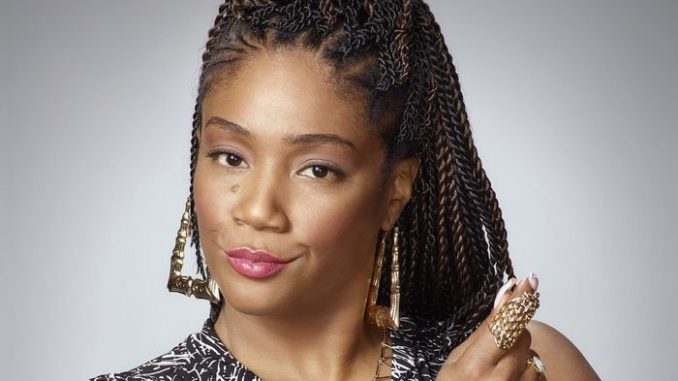

by Michael P. Jeffries
When comedian Tiffany Haddish was 9, her stepfather tampered with the brakes on her mother’s car, hoping to kill his partner and her four children. Rather than going out with her mom that day, Haddish asked to stay home and look after her younger siblings—sparing her from the horrific accident that left her mother mentally impaired. As the oldest child, Haddish did what she could to help for three years, from tying her mother’s shoes to paying bills, but eventually Haddish and her siblings were placed in foster care.
Haddish used the trauma and tragedy of her upbringing to ignite what is now a blazing comedy career. As a child, the Girls Trip star was teased for being a foster kid, but Haddish has also talked about maintaining a strong sense of self worth in her recent Showtime standup special, She Ready!: From the Hood to Hollywood. “The state of California paid so much money to make sure I don’t die ‘cause they knew I was gonna be special,” Haddish tells her audience. “They knew it. They was like, ‘This one right here, she gonna be a unicorn.’ And they was right. I’m the last black unicorn!”
Haddish’s ascent in recent years – debuting on NBC’s The Carmichael Show in 2015 and appearing in the 2016 action comedy Keanu and the summer hit Girls Trip – is a testament to her talent and resilience. But her story also offers insight into what it takes for a black woman in comedy to become successful today. Haddish’s rise points to where systemic roadblocks still lie for performers of color, particularly women, when they first enter the business—and how some barriers to entry may be falling as comedy enters a new golden age, with fewer gatekeepers and more platforms for artists to reach their fans.
Even though Girls Trip has a black director and writers, Haddish faced questions about her low profile. Her agent initially told her that studio executives were looking for someone with a bigger name to play her character, Dina. Haddish told her agent to tell them, “I’ve had a name since 1979. Okay? I was born with a name.” In the end, her rare comedic gifts won out, and reviews of Girls Trip regularly singled Haddish out for praise.
With every dollar Girls Trip earns, Hollywood has even fewer excuses for overlooking black women. Haddish’s speech patterns during performances place her within the rich tradition of black vernacular comedy, but she appeals to a wide cross section of fans. Insecure cast member Amanda Seales told The Los Angeles Times that black women in particular often feel pressure to “figure out how to get into the mainstream, be the ‘it girl,’ and get the whites to like you.” As Seales suggests, comedians of color often have to train themselves to “cross over” in order to appeal to white audiences, in a way that white comics don’t have to. While Haddish’s relatively light skin and slim body type help distance her from racist stereotypes of sexually aggressive black womanhood, she also refuses to tone down her act. She complements her physical abilities with a sharp focus on black women’s pleasure, both on stage and in Girls Trip.
Haddish herself got her start at a Laugh Factory comedy-camp program tailored to young performers from underprivileged backgrounds. She was mentored by stars like Richard Pryor and Dane Cook, and she has said the camp boosted her confidence and set her on the path to stardom. As Haddish explained in an interview with People, “Going to that comedy camp and having all those men tell me, ‘You’re beautiful. You’re smart. You’re talented.’ Like, for somebody to tell me that, even if they didn’t believe it or mean it, it was enough. It was enough to light a fire.”
Haddish’s career took a rather traditional route, from doing standup at major clubs, to landing a sitcom role on a major network, to starring in a movie from a major studio. Ultimately, however, Haddish’s future and the future of black women in comedy may lie elsewhere. Digital production and distribution, as well as social media, have wrested some power from television and film studios and placed it in the hands of artists. Issa Rae started Awkward Black Girl as a YouTube web series before getting a deal with HBO to make her show Insecure. Phoebe Robinson and Jessica Williams are following in Rae’s footsteps, and the co-hosts of the WNYC 2 Dope Queens podcast will take their act to HBO as well. As Robinson explained, becoming a content producer, rather than just a performer, means, “You can be more in charge of your destiny, rather than, ‘I hope someone will cast me as something.’” This approach allows artists to cultivate a following and demonstrate their worth without first needing a major investment from a film company.
Though these new channels exist, movie and television studios still wield tremendous power. So when financial investment from studios does come—as it has for Haddish, who just inked a deal to star alongside Kevin Hart in the 2018 film Night School – stars can maximize their influence by forming their own production companies. Hart has already taken steps to ensure black creators have more access to the writers’ room and director’s chair (the Girls Trip director Malcolm D. Lee will helm Night School). Historically, the success of men like Hart, Pryor, Bill Cosby, Eddie Murphy, Dave Chappelle, and Chris Rock has not opened as many doors for black women in comedy. But for all the challenges that remain, Haddish and her peers now have new outlets and platforms for ensuring their work reaches fans – and that there will be many more black unicorns to come.

Be the first to comment